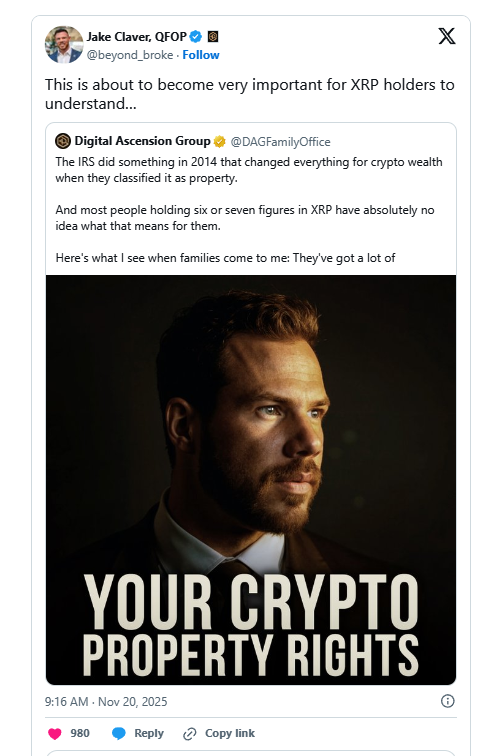- Many XRP holders are legally exposed because assets in personal wallets can be discovered and seized in lawsuits.
- Trusts, step-up in basis, and tax-free gifting help protect and preserve long-term XRP wealth.
- Borrowing against crypto, institutional custody, and Wyoming LLCs add stronger security and financial flexibility.
A growing number of XRP investors are being told to rethink how… well, how exposed their holdings really are. Jake Claver, who runs Digital Ascension Group, keeps warning that too many people treat their crypto like some private stash instead of a real asset with legal and tax rules wrapped around it. In his https://blocknews.com/category/crypto/ripple-xrp/view, holding large amounts of XRP without a legal structure is kind of like leaving the keys in the ignition and hoping no one notices, which eventually leads to painful lawsuits or messy probate fights.

How Legal Exposure Creeps Up On XRP Investors
Claver explains that the IRS treats XRP the same way it treats other property—pretty straightforward, but also pretty dangerous if you ignore it. Because of that classification, wealthy investors can use time-tested tools to secure their crypto. Still, he says most holders skip these protections completely, thinking a personal wallet somehow makes them invisible. It doesn’t. Assets kept in a private wallet can be discovered in court, and a judge could order access to the private keys. Trying to dodge that kind of order might even land someone in contempt, which is… definitely not ideal.
Why Trusts, Gifting, and Step-Ups Matter More Than People Think
Claver keeps stressing how important structures like revocable living trusts are for XRP families who want to avoid years of legal turbulence. Without them, everything from inheritance disputes to surprise tax bills can blow up fast. He also brings up a perk many holders forget about: the step-up in basis when someone passes away. If XRP was picked up at $0.50 and the investor dies when it’s worth $100, the heir gets it valued at $100—no capital gains on decades of growth. And for people with sizable stacks, there’s the annual gift exemption, letting individuals pass on up to $13.6 million tax-free, or double that for couples, which is a huge lever for long-term wealth.
Borrowing, Custody, and LLCs: Tools Big Money Already Uses
Another point Claver pushes is borrowing against crypto; wealthy folks do it constantly because it lets them pull liquidity without triggering taxes. He even cites Elon Musk using this strategy for that massive Twitter purchase, saying XRP holders can adopt the same playbook. For extra security, he suggests institutional custody to keep assets insured and insulated from bankruptcy risk, so they don’t vanish during a hack or insolvency. And then there’s the Wyoming LLC angle—moving XRP into that kind of entity provides charging-order protection, meaning creditors can’t just swoop in and grab the assets. If the corporate records are clean and maintained, the shield gets even stronger.
A Shift In Mindset For XRP Wealth Preservation
Claver ends with something of a reality check. Too many XRP holders, he says, still treat their tokens like a lottery ticket instead of a real asset deserving real protection. Wealthy families treat their holdings like commercial real estate—structured, shielded, and built to last. Claver thinks XRP investors should start doing exactly the same if they actually want that wealth to survive more than one generation.














